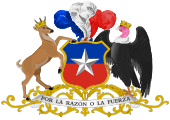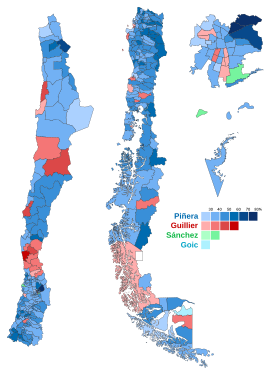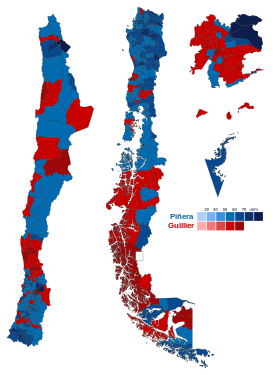
Back انتخابات الرئاسة التشيلية 2017 Arabic Präsidentschafts- und Parlamentswahl in Chile 2017 German Χιλιανές γενικές εκλογές (2017) Greek Elección presidencial de Chile de 2017 Spanish Élection présidentielle chilienne de 2017 French Elezioni generali in Cile del 2017 Italian Eleição presidencial no Chile em 2017 Portuguese Президентские выборы в Чили (2017) Russian 2017年智利大選 Chinese 第40屆智利總統選舉 ZH-YUE
|
| |||||||||||||||||||||||||||||||||||||||
Presidential election | |||||||||||||||||||||||||||||||||||||||
| |||||||||||||||||||||||||||||||||||||||
| |||||||||||||||||||||||||||||||||||||||
| |||||||||||||||||||||||||||||||||||||||
All 155 seats | |||||||||||||||||||||||||||||||||||||||
This lists parties that won seats. See the complete results below.
| |||||||||||||||||||||||||||||||||||||||
23 of the 43 seats | |||||||||||||||||||||||||||||||||||||||
This lists parties that won seats. See the complete results below.
| |||||||||||||||||||||||||||||||||||||||
 |
|---|
|
|
General elections were held in Chile on 19 November 2017, including presidential, parliamentary and regional elections.
Voters went to the polls to elect:
- A President of the Republic to serve a four-year term.
- Twenty three of 43 members of the Senate to serve an eight-year term in the National Congress.
- The full 155 members of the Chamber of Deputies to serve a four-year term in the National Congress.
- The full 278 members of the regional boards to serve a four-year term.
In the presidential election, former president Sebastián Piñera received a lower-than-expected 36% of the vote, nearly 14 points ahead of senator Alejandro Guillier, who was backed by the sitting administration. In the runoff election on 17 December 2017, Piñera surprised many by defeating Guillier with 54% of the vote, and turnout was two points higher than in the first round.
In the parliamentary elections, the Chile Vamos coalition, which supported Piñera's candidacy, won 46% of the Chamber of Deputies and 44% of the Senate, while the governing New Majority alliance, which competed without the Christian Democrats for the first time in 28 years, failed to retain its majority in both chambers, receiving just 28% and 35% in the lower and upper chambers, respectively. The leftist bloc Broad Front elected 20 deputies (13%) and gained one senator. The Christian Democratic Party received 9% of the lower chamber and secured 14% of the Senate.
Following an election reform in 2015, the Chamber of Deputies grew in size to 155 members from the previous 120, while the Senate increased its membership from 38 to 43 after this election, and will grow to 50 following the election in 2021.[1] Multi-seat constituencies were reestablished, replacing the previous binomial system of two seats per district, installed by the outgoing Pinochet dictatorship in 1989.[2][3] For the first time, a 40% gender quota was put in place for candidates of each political party in parliamentary elections.[4]
All the newly elected officials began their terms on 11 March 2018.
This was the first non-primary election in which Chilean citizens voted from abroad.[5]
- ^ "El sistema electoral pasa su prueba de fuego". La Tercera. 20 November 2017.
- ^ "Ley 18.799". Leychile.cl. Retrieved 19 December 2017.
- ^ Rahat, Gideon; Sznajder, Mario (1 December 1998). "Electoral engineering in Chile: the electoral system and limited democracy". Electoral Studies. 17 (4): 429–442. doi:10.1016/S0261-3794(98)00001-8 – via ScienceDirect.
- ^ "Hoy se promulgó reforma al Sistema Electoral que incluye cuotas de género – ComunidadMujer". 27 April 2015. Archived from the original on 7 November 2017. Retrieved 30 October 2017.
- ^ "Voto de chilenos en el exterior". ChileAtiende.
© MMXXIII Rich X Search. We shall prevail. All rights reserved. Rich X Search





